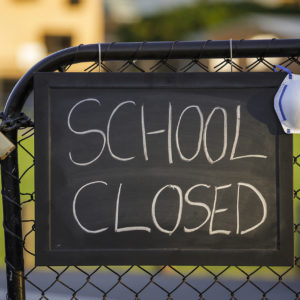Editor’s Note: For another viewpoint, see Counterpoint: Ditching Accountability for Schools Should Get Failing Grade
As the dog days of summer drag on, schools throughout the country need to make decisions regarding their reopening procedures. In general, schools should err on the side of reopening with in-person learning as much as possible.
According to the American Academy of Pediatrics, “AAP strongly advocates that all policy considerations for the coming school year should start with a goal of having students physically present in school. The importance of in-person learning is well-documented, and there is already evidence of the negative impacts on children because of school closures in the spring of 2020.”
As a former public high school teacher, I could not agree more. Almost all teachers and parents know that in-person instruction, especially for young students, is better than online learning. There is no substitute for the hands-on learning, collaboration and one-on-one instruction that takes place in a classroom setting.
Aside from the superior quality of instruction that in-person teaching produces, it is also important for students of all ages to be around their peers and teachers.
As AAP states, “Lengthy time away from school and associated interruption of supportive services often results in social isolation, making it difficult for schools to identify and address important learning deficits as well as child and adolescent physical or sexual abuse, substance use, depression and suicidal ideation.”
During my teaching career, I helped several students deal with things that were well outside the realm of academic instruction. As a teacher, one’s responsibility to one’s students exceeds the curriculum. Without in-person instruction, countless children will not receive the social services or socialization they desperately need.
Shutting schools this fall will also have an outsized effect on low-income communities. Because students in these areas do not have comprehensive access to home computers and the internet, they are put at a disadvantage compared to their peers in high-income communities.
Further, parents and guardians of students in low-income school districts typically cannot stay at home with their children during the day because they have jobs and other responsibilities. This also applies to high-income families of course.
However, high-income families typically have more ability to work from home or a non-working parent to help their children learn at home. Not reopening schools will have a disparate impact on low-income students.
Moreover, across the board, parents support reopening schools because they are well aware of the superior education in-class instruction provides.
According to a July 27 Kaiser Family Foundation Health Tracking Poll, “If schools don’t reopen, about two-thirds of parents are worried about their children falling behind socially and emotionally (67 percent) and academically (65 percent), and about half worry about losing income if they can’t go to work (51 percent) or not being able to pay enough attention to their kids if they’re working at home (47 percent).”
Perhaps most significantly, data show that children are extremely unlikely to suffer dire health consequences from coronavirus.
According to the U.S. Centers for Disease Control and Prevention, “Children were 0 percent-0.8 percent of all COVID-19 deaths, and 20 states reported zero child deaths. … In states reporting, 0 percent-0.3 percent of all child COVID-19 cases resulted in death.” In Europe, and several other places, schools have already reopened (or never closed in the first place), with virtually no adverse effect to date.
Of course, teachers and administrators are much more vulnerable to COVID-19, which means common-sense measures and innovations should be taken to protect them as much as possible.
While the evidence demonstrates that schools should reopen for a variety of reasons, they might not because teachers unions and politicians oppose it for their own self-interest.
Teachers unions throughout the nation are making outrageous demands before they return to their jobs. This includes defunding the police, Medicare for All, huge salary increases, and several other requirements that have little to do with improving the education environment.
Shockingly, several teachers unions have announced they will not return to work unless and until “a moratorium on private school” is implemented. In other words, they want to destroy their competition and leave Americans with nothing but public schools. This is particularly vexing because the vast majority of Americans support school choice.
Sadly, many politicians are siding with teachers unions in opposing schools reopening, likely to score political points with one of their most loyal constituencies and biggest donors: educators.
There is a mountain of evidence to support students going to back to school this fall. Most parents favor this position as well. Unfortunately, there is a small but powerful group of union leaders and politicians who are trying to prevent this.
Unlike the students I taught, I hope they fail.

